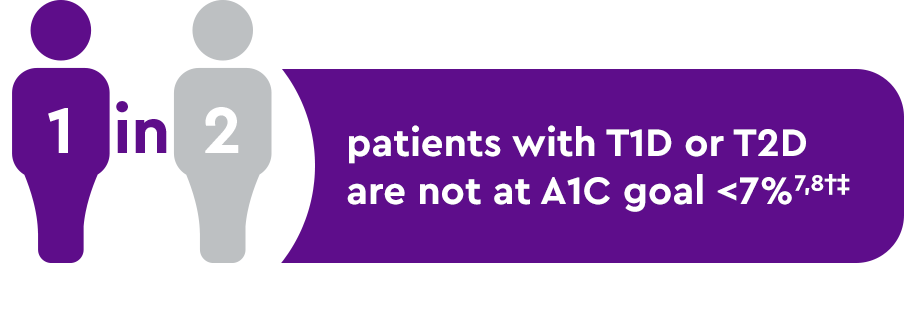READY for ultra rapid-acting insulin
- Fast In—insulin enters the blood in <1 minute with first
measurable effect in ~12 minutes1,5 - Fast Effect—time to peak effect occurs in 35-45 minutes*
- Fast Out—insulin effect lasts approximately 1.5-3 hours*
*Based on 4- to 12-unit dosing, respectively. On average, the pharmacodynamic
effect of Afrezza—measured as area under the glucose infusion rate time curve
(AUC GIR)—increased linearly with doses up to 48 units.1,2
Get SET with proven control in T1D and T2D1,6
Many patients with diabetes do not achieve treatment goals, despite advancements in diabetic therapy and technology over the last decade7,8

A1C=glycated hemoglobin; T1D=type 1 diabetes; T2D=type 2 diabetes.
†Data from a longitudinal study on diabetes management, whereby outcomes were collected from 2016-2018 and compared with outcomes collected from 2010-2012 (n=22,697). To minimize the impact of potential cohort and duration effects, cross-sectional comparisons of (adjusted mean) A1C included 9,657 patients contained in both time cohorts with ≥3 years of duration at the time of the 2010-2012 data collection.7
‡Data from a retrospective, observational study that used real-world data (i.e., electronic medical records) to evaluate the probability of achieving glycemic control over 24 months after initiation of basal insulin in patients (n=6,597) with T2D who fail to achieve A1C<7% while taking oral antidiabetic medications (i.e., mean A1C was 9.1% at baseline).8
INHALE at mealtime
for management in the moment
- Flexible dosing1,4
- No injections at mealtime1
Help your patients get started on Afrezza
References: 1. Afrezza (insulin human) Inhalation Powder Prescribing Information. MannKind Corporation. 2. Rave K, Heise T, Heinemann L, Boss AH. Inhaled Technosphere insulin in comparison to subcutaneous regular human insulin: time action profile and variability in subjects with type 2 diabetes. J Diabetes Sci Technol. 2008;2(2):205-212. 3. Boss AH, Petrucci R, Lorber D. Coverage of prandial insulin requirements by means of an ultra-rapid-acting inhaled insulin. J Diabetes Sci Technol. 2012;6(4):773-779. 4. Akturk HK, Snell-Bergeon JK, Rewers A, et al. Improved postprandial glucose with inhaled Technosphere insulin compared with insulin aspart in patients with type 1 diabetes on multiple daily injections: the STAT study. Diabetes Technol Ther. 2018;20(10):639-647. 5. Data on file. MannKind Corporation. 6. Bode BW, McGill JB, Lorber DL, Gross JL, Chang PC, Bregman DB. Inhaled Technosphere insulin compared with injected prandial insulin in type 1 diabetes: a randomized 24-week trial. Diabetes Care. 2015;38(12):2266-2273. 7. Foster NC, Beck RW, Miller KM, et al. State of type 1 diabetes management and outcomes from the T1D exchange in 2016-2018. Diabetes Technol Ther. 2019;21(2):66-72 8. Blonde L, Meneghini L, Peng XV, et al. Probability of achieving glycemic control with basal insulin in patients with type 2 diabetes in real-world practice in the USA. Diabetes Ther. 2018;9(3):1347-1358.
US-AFR-2333



